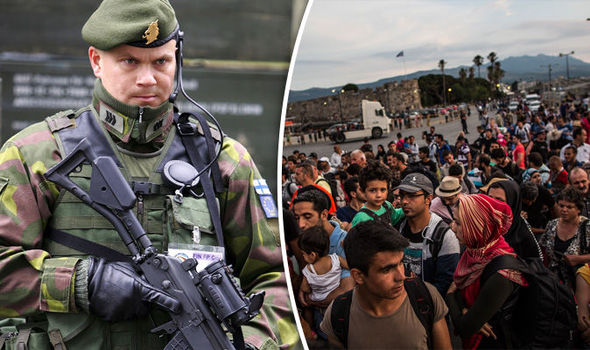Death of democracy? Brussels could deploy own ARMY within the EU as migrant crisis deepens

BRUSSELS has been urged to deploy its own armed forces within the EU for the first ever time in a move which would sound the death knell for European democracy.
European leaders are being asked to dispatch troops to Greece — the cradle of democracy — to combat the spiralling migrant crisis.
If the plan is put into action it would be the first ever time that the EU has deployed its own forces, which typically carry out peace missions abroad, within the 28-nation bloc.
But the move could be fiercely opposed by Greece, which would see it as the final nail in the coffin for its democratic government following years of financial suppression at the hands of its Brussels paymasters.
The sight of troops bearing the EU ensign patrolling Greek soil would encapsulate the end of individual member state sovereignty by removing one of the last sacrosanct areas of independence — responsibility for defence of the realm.
The controversial plan has been proposed by a senior Austrian official, who said the only way for the continent to regain control of the migrant situation is to send its own troops in to man Greece's border with Macedonia.
Minister Hans Peter Doskozil called for a "bridging mission" that would register asylum seekers in Greece or send them back because the EU's civilian border agency is working "too slow".
His remarks come after Europe's deal with Turkey to stem the flow of asylum seekers was left in chaos last night as hundreds of migrants continued to flood into Greece.
Mr Doskozil raged: "In the past Frontex was responsible for securing the (EU's external) borders but Frontex is too slow because of the way it operates.
"Therefore we suggest finding joint solutions in cooperation with ministries of foreign affairs and internal affairs."
The EU has proposed a task force of some 4,000 staff under Frontex auspices, which will include judges, interpreters and border guards to help Greece sift through thousands of asylum applications.
Greece is sheltering around 43,000 refugees and migrants and more continued to arrive on Monday despite the deal to return illegal migrants to Turkey in exchange for Syrian refugees was struck by European Union leaders with the Turkish government on Friday.
But today it emerged the Greek government would not be able to implement the deal immediately and many officials appeared to know little about how it would work.
Migration spokesman Giorgos Krytsis said none of the promised experts had arrived and key details of the agreement still needed to be worked out.
So far this year more than 143,000 men, women and children from the Middle East and Africa have crossed the sea to Greece in the hope of a new life in the promised land of Europe.
Under the controversial plan any who arrived after midnight on Saturday should be returned to Turkey if they do not lodge immediate asylum claims or their asylum claims are rejected.
EU countries have agreed to admit one Syrian direct from camps in Turkey in return for every Syrian returned from Greece, with priority given to those who have not tried to enter Europe illegally before.
Under that pact, Ankara will take back all migrants and refugees, including Syrians, who cross to Greece illegally by sea.
In return, the EU will take in thousands of Syrian refugees directly from Turkey and make financial and political concessions to Ankara.
In support of Mr Doskozil's comments, the Austrian spokesman for Doskozil, said: "It would be an EU military mission to implement the decisions of the (European) Council quickly.
"Frontex must hire 4,000 staff. One can imagine it will take a while before Frontex has that many staff.
"The minister is therefore saying 'Why don't we deploy the military to bridge the gap until Frontex is operational?'
"If Frontex needs months before it is fully operational, that will help no one."
Mr Doskozil's proposals will be discussed at a meeting of central European defence ministers in Vienna next week.
Last month Austria took the lead in co-ordinating a slew of border restrictions spanning the Balkans that have caused a worsening logjam of migrants stuck in Greece.
Vienna hopes migrants will find new paths into central Europe following the controversial closure of the Balkan route and will therefore strengthen controls on the Brenner border crossing between Austria and Italy.
Политика конфиденциальности | Правила пользования сайтом










